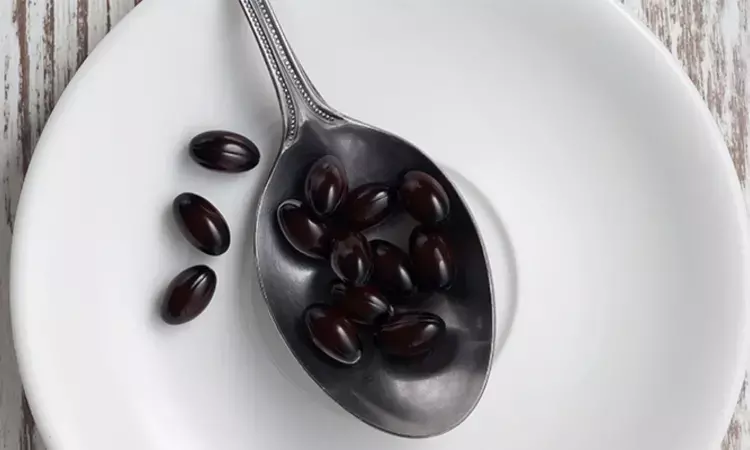- Home
- Medical news & Guidelines
- Anesthesiology
- Cardiology and CTVS
- Critical Care
- Dentistry
- Dermatology
- Diabetes and Endocrinology
- ENT
- Gastroenterology
- Medicine
- Nephrology
- Neurology
- Obstretics-Gynaecology
- Oncology
- Ophthalmology
- Orthopaedics
- Pediatrics-Neonatology
- Psychiatry
- Pulmonology
- Radiology
- Surgery
- Urology
- Laboratory Medicine
- Diet
- Nursing
- Paramedical
- Physiotherapy
- Health news
- Fact Check
- Bone Health Fact Check
- Brain Health Fact Check
- Cancer Related Fact Check
- Child Care Fact Check
- Dental and oral health fact check
- Diabetes and metabolic health fact check
- Diet and Nutrition Fact Check
- Eye and ENT Care Fact Check
- Fitness fact check
- Gut health fact check
- Heart health fact check
- Kidney health fact check
- Medical education fact check
- Men's health fact check
- Respiratory fact check
- Skin and hair care fact check
- Vaccine and Immunization fact check
- Women's health fact check
- AYUSH
- State News
- Andaman and Nicobar Islands
- Andhra Pradesh
- Arunachal Pradesh
- Assam
- Bihar
- Chandigarh
- Chattisgarh
- Dadra and Nagar Haveli
- Daman and Diu
- Delhi
- Goa
- Gujarat
- Haryana
- Himachal Pradesh
- Jammu & Kashmir
- Jharkhand
- Karnataka
- Kerala
- Ladakh
- Lakshadweep
- Madhya Pradesh
- Maharashtra
- Manipur
- Meghalaya
- Mizoram
- Nagaland
- Odisha
- Puducherry
- Punjab
- Rajasthan
- Sikkim
- Tamil Nadu
- Telangana
- Tripura
- Uttar Pradesh
- Uttrakhand
- West Bengal
- Medical Education
- Industry
Astaxanthin lowers cholesterol and CVD risk in people with prediabetes and dyslipidemia

USA: A recent study published in Diabetes, Obesity and Metabolism has shown that astaxanthin, a natural antioxidant is a safe over-the-counter (OTC) supplement that improves markers of CVD (cardiovascular disease) risk and lipid profiles in people with prediabetes and dyslipidemia.
"The authors wrote, "although the primary endpoint did not meet the prespecified significance level."
Astaxanthin is a natural carotenoid having anti-inflammatory and antioxidant effects. It can resist diseases caused by oxidative stress, such as neurodegenerative diseases, metabolic syndromes, inflammatory diseases, cardiovascular diseases, and age-related diseases. Cardiovascular disease is the leading cause of death in the world. There has been a rise in research showing that astaxanthin affects cardiovascular disease. However, there are some controversies about the conclusions.
Against the above background, Theodore P. Ciaraldi from the University of California in San Diego, La Jolla, CA, and colleagues conducted a double-blind, placebo-controlled, randomized trial to determine the effects of treatment with astaxanthin on glucose tolerance, CVD markers, lipids, inflammation, and insulin action in people with dyslipidemia and prediabetes.
The study included 34 adult participants with dyslipidemia and prediabetes who underwent an oral glucose tolerance test (OGTT), blood draw, and a one-step hyperinsulinemic-euglycemic clamp. Twenty-two were randomized to the treated group (astaxanthin 12 mg daily) and 12 to the placebo for 14 weeks. Following 12 and 24 weeks of therapy, baseline studies were repeated.
The study led to the following findings:
- After 24 weeks, astaxanthin treatment significantly reduces total cholesterol (-0.30 ± 0.14 mM) and LDL-cholesterol (-0.33 ± 0.11 mM).
- Astaxanthin also lowered the levels of the CVD risk markers L-selectin (-0.08 ± 0.03 ng/mL), fibrinogen (-473 ± 210 ng/mL), and fetuin-A (-10.3 ± 3.6 ng/mL).
- The effects of astaxanthin treatment did not reach statistical significance. Still, there were trends towards improvements in the primary outcome measure, insulin-stimulated whole-body glucose disposal (+0.52 ±0.37 mg/m2/min), as well as fasting [Insulin] (-5.6 ± 8.4 pM), and HOMA2-IR (-0.31 ± 0.16), suggesting improved insulin action.
- The authors did not observe any consistent significant differences from baseline for any of these outcomes in the placebo group.
- Astaxanthin was well tolerated and safe, with no clinically significant adverse events.
"Although the primary endpoint did not meet the prespecified significance level, these data indicate that astaxanthin is a safe OTC supplement that improves markers of CVD risk and lipid profiles in individuals with prediabetes and dyslipidemia," the researchers conclude.
Reference:
Ciaraldi, Theodore P., et al. "Astaxanthin, a Natural Antioxidant, Lowers Cholesterol and Markers of Cardiovascular Risk in Individuals With Prediabetes and Dyslipidemia." Diabetes, Obesity & Metabolism, 2023.
Dr Kamal Kant Kohli-MBBS, DTCD- a chest specialist with more than 30 years of practice and a flair for writing clinical articles, Dr Kamal Kant Kohli joined Medical Dialogues as a Chief Editor of Medical News. Besides writing articles, as an editor, he proofreads and verifies all the medical content published on Medical Dialogues including those coming from journals, studies,medical conferences,guidelines etc. Email: drkohli@medicaldialogues.in. Contact no. 011-43720751


